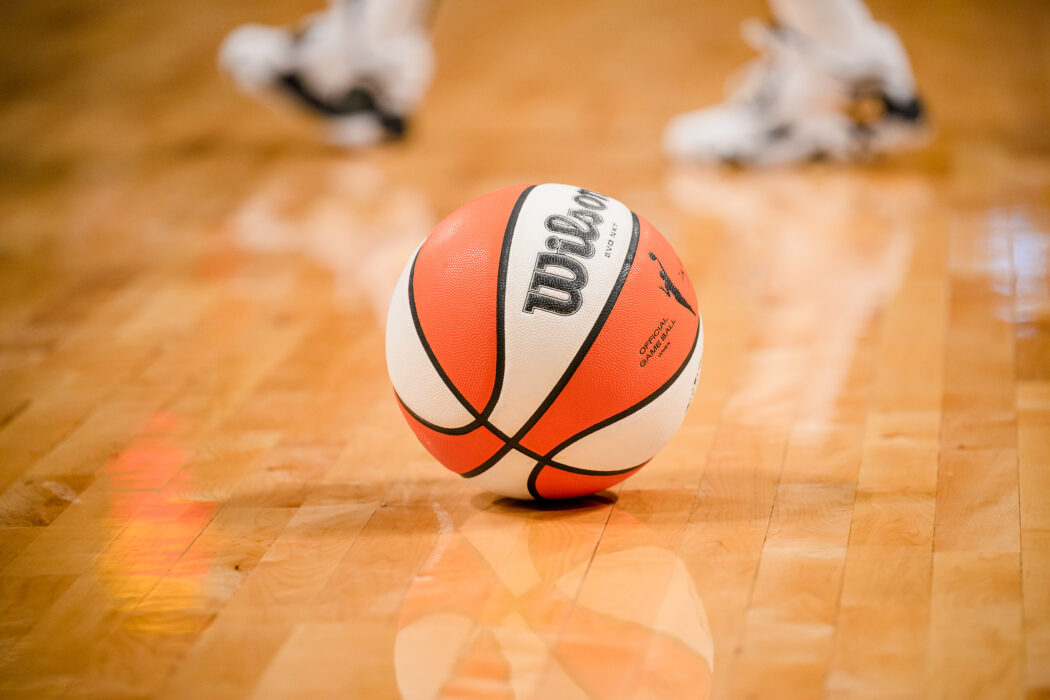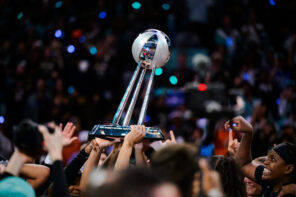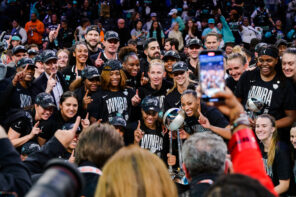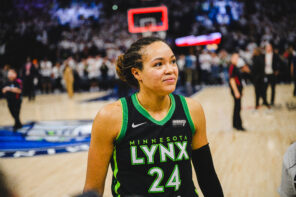One can call this piece “Doble U Ene Be A.”
Just in time for Hispanic Heritage Month, the esteemed sports personality Greydy Diaz (who we got a picture with alongside Sylvia Fowles and Khristina Williams at WNBA All-Star in Chicago) mentioned that several NBA teams had launched social media channels in Spanish.
According to Diaz, these included the Washington Wizards, Chicago Bulls, Dallas Mavericks, Oklahoma City Thunder, Philadelphia 76ers, Phoenix Suns and San Antonio Spurs.
Many of the aforementioned teams play in cities with sizable Brown populations.
The NBA obviously acknowledges that its continued growth cannot possibly happen without outreach to the country’s largest minority group – Hispanics.
Can someone find a picture of Cathy Engelbert and the WNBA taking notes on the subject of the NBA’s Hispanic outreach? There needs to be one because the W ought to be doing just that.
With as much Black and LGBTQIA outreach as the league has done throughout its history, a push to get the Latino community to WNBA games should be just as high on its wish list.
The WNBA already has a potential groundwork to really make the Latino community every bit as a reliable demographic as the LGBTQIA and Black communities. Out of the W’s 12 teams, eight of them play in markets with significant Brown populations. Among those teams is the 2022 WNBA champion Las Vegas Aces.
In addition, the New York Liberty, Los Angeles Sparks, Chicago Sky, Washington Mystics, Phoenix Mercury, Dallas Wings and Atlanta Dream also play in markets where its Hispanic populations make up a sizable percentage of their overall populations.
Among Brown communities, basketball may not necessarily be the sport that soccer, boxing and baseball are given the significant number of Latinos that partake in those athletic disciplines. It is not as if the WNBA is completely devoid of players that can be crucial in outreach to the Hispanic community.
(side note – let’s start capitalizing the B in Brown as we do the B in Black).
One has to look no further than the Puerto Rican national team to see this reality. Among the noteworthy names taking to the court for Las Boricuas are Arella Guirantes who played the first two seasons of her WNBA career with the Sparks (and also happens to be Long Island’s very own – shoutout to Bellport High School).
In addition, Mya Hollingshed, who was originally drafted by the Aces before being waived is also on Puerto Rico’s national team. Puerto Rico is playing with heavy hearts in Australia at the FIBAs given the island is facing an unimaginable deal of adversity in the aftermath of Hurricane Fiona.
Jazmon Gwathmey is also a noteworthy name from previous international competitions, but she has been sidelined from this year’s FIBA World Cup due to injury. Puerto Rico, part of Group A, finished with a 2-3 record (wins against Korea, Bosnia and Herzegovina) in group play (losses to United States, Belgium and China) to advance to a quarterfinal matchup against Canada on Thursday.
Outreach to Hispanic communities can not only take shape in WNBA marketing decisions – it also can in terms of which cities it decides to expand to. In the early days of the W, one of its teams happened to be in South Florida – the Miami Sol. Ruth Riley Hunter, who now is part of the broadcast team for Miami Heat games on Bally Sports Florida/Sun, was one of the marquee players for Las Sol.
The state of Florida as a whole has its own political issues that may make any of its cities less than desirable candidates for an expansion franchise. But, there is no denying that the WNBA could take a huge step forward in its Latino outreach efforts if the east coast franchise that gets a new team (along with the west coast franchise that will likely be another hub of Hispanic culture in the San Francisco Bay Area) happens to call Miami home.
And as we mentioned in our recent Bay Area column where we believe Oakland would be a better choice for the WNBA over San Francisco, the marketing efforts of any team there ought to include a significant push for Latino, Asian and LGBTQIA fans. Oakland also has the benefit of, arguably, being the hub of Black culture on the west coast – unless south central LA has something to say about it.
Another way the W can accomplish this is selling Spanish-language television rights. And the WNBA should accept nothing less than top dollar if and when an ESPN Deportes, Fox Deportes, Telemundo and TUDN were to vie for said rights.
The bottom line is any organization engaging in minority outreach ought to prioritize a push to the Brown community as it does the Black community. The W is in a good position to do given it already plays in a number of Brown cities and there are noteworthy names that can increase the visibility of Hispanics when watching WNBA games.
All of this combined can go a long way into making the W un boleto caliente among Latinos.




